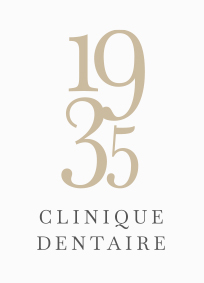Receding gums are a common dental problem. While some oral pathologies appear suddenly, receding gums are not immediately recognizable or perceptible.
Do you think you may have receding gums? Our Montreal dentists explain the causes and treatments of this common problem.
What are receding gums?
Gum recession, or receding gums, refers to the progressive reduction of the gum tissue surrounding the teeth, leaving the tooth roots exposed. This condition can be caused by several factors, and it can have serious consequences for oral health if not treated in time.
It’s essential to take gum recession seriously and treat it early. In addition to the immediate consequences for oral health, untreated receding gums can also have an impact on the appearance of your smile, making your teeth and gums look uneven.
What are the symptoms of receding gums?
Receding gums are easy to spot since they have a direct impact on the appearance of your mouth. Various other symptoms may also be linked with this condition:
- Teeth appear longer: If you suffer from receding gums, your teeth may begin to look longer as the gum tissue recedes. Loose teeth are another symptom of gum recession.
- Increased tooth sensitivity: Since exposed tooth roots are more sensitive to external stimuli, you may experience increased pain or sensitivity when consuming hot, cold or acidic foods and beverages.
- Red, swollen gums: Receding gums may appear red and inflamed and be more sensitive to the touch. They may also bleed more easily when you brush or floss.
- Gaps between teeth: As gum tissue retracts, gaps or diastema may begin to form between your teeth.
- Change in the appearance of your smile: As teeth loosen, the contour of the gums may appear uneven and your smile may look different.
Symptoms of gum recession can vary depending on the severity of the condition and individual sensitivity. Contact a dental professional if you observe any of the above symptoms.
What causes receding gums?
Several factors can lead to gum recession, which usually appears in adulthood:
- Poor oral hygiene: Inadequate oral hygiene is one of the main causes of gum recession. Not brushing regularly, not flossing, and neglecting dental visits can lead to plaque and tartar build-up, which irritates the gums and can gradually cause receding gums.
- Aggressive tooth brushing: Brushing with a hard toothbrush or not brushing properly can damage gum tissue, causing it to recede over time.
- Periodontal disease: Periodontal disease, also known as periodontitis, is a chronic bacterial infection that affects the gums and supporting structures of the teeth. If left untreated, it can lead to tooth loosening.
- Genetic factors: Some people may be genetically predisposed to suffer from sensitive gum tissue, making them more likely to develop receding gums.
- Harmful habits: Habits such as smoking and excessive alcohol consumption can weaken gum tissue, impair blood flow to the gums and increase the risk of developing receding gums.
- Dental trauma: Repeated trauma to the gums, such as excessive use of interdental brushes or toothpicks, as well as teeth grinding (bruxism), can contribute to gum recession.
- Misaligned teeth: Misaligned teeth can exert uneven pressure on gum tissue, causing it to gradually recede.
How can receding gums be treated?
It is possible to treat receding gums with appropriate dental care and avoid some of the consequences of this condition. Let’s take a look at two common procedures used to treat receding gums.
Gum grafts
Gingival graft surgery involves attaching tissue from elsewhere in the patient’s mouth (or a gingival tissue substitute) to the affected gum area. The procedure covers exposed roots and restores missing gum tissue.
There are three types of gum graft: free gingival grafts (this does not mean free of charge), pedicle grafts (tissue from beside the affected area is turned down to cover the area of the receding gums) or connective tissue grafts (a piece of connective tissue from the patient’s palate is attached to the recessive gum area). Each method will restore the appearance of your gums, reduce tooth sensitivity and prevent further gum recession. Depending on the type of graft, the healing time and level of discomfort following the procedure may vary.
Gum contouring
Gum contouring, also known as gingival contouring, is a permanent treatment that addresses an uneven gum line, especially in cases of receding gums or elongated teeth.
The main purpose of gum contouring is to enhance the appearance of your smile. However, it can also serve as a preventive measure against periodontal disease.
It’s important to note that the choice of treatment will depend on the severity of the tooth loosening, the patient’s preference and the dental professional’s assessment. A complete evaluation of your situation will be necessary to determine the best treatment option for you.
Take care of your dental health at Clinique Dentaire 1935
Gum recession is a serious problem that can have significant consequences for oral health. We are happy to tell you that there are several effective treatment options available to correct receding gums and loose teeth, and prevent associated complications.
If you think your gums may be receding, consult a dental professional for an accurate diagnosis and a personalized treatment plan.
Clinique Dentaire 1935 has a team of highly qualified professionals in the field of periodontics and gum recession treatment. We will thoroughly assess your condition and recommend the best treatment to keep your gums healthy in the long run. Call us for an appointment!
